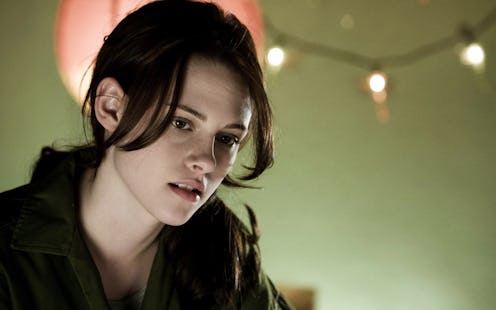Entertainment
Can We Admit K. Stew Is A Great Actress Now?

I never could have predicted how great a percentage of my 20s would be spent speaking in defense of Kristen Stewart. I’ve sung her praises over comic endeavors like Adventureland, broadcast my appreciation of her head-to-head with Julianne Moore in Still Alice, and haven’t shut up about how damn spectacular she is in Clouds of Sils Maria. And yet, no matter how emphatically I declaim the incalculable talent of the 25-year-old movie star, I’m more often than not met with the same counter: “Yeah, but Twilight.” As if she's somehow less of an actress because of the project that made her famous.
It is a vexing irony that the very franchise that launched Stewart to notability in the first place is what anchors her down in her flight to bona fide esteem. She’s hardly the only young actor to wear the shackles of the YA franchise that birthed her. In fact, she’s not even the only Stephenie Meyer vet to bear this cross. Robert Pattinson likewise knows the weight of Twilight, chained perpetually thereto in spite of having exhibited definitive skill in films like Cosmopolis, The Rover, and Maps to the Stars. Pattinson’s newest endeavor takes place behind the camera as the actor tries his hand at screenwriting, focusing in particular on the science fiction blockbuster genre. Whether Pattinson’s scripting undertaking will be a great enough leap to estrange him from his YA handicap has yet to be seen.
But while Pattinson has no doubt endured a rocky road along his journey to big screen acclaim, we can identify an important difference between his and Stewart’s challenges toward the end of reconstructing their names in a post-Twilight era. Said differences can be spotted almost immediately upon looking at each actor’s lineup of films to release since Breaking Dawn — Part 2. Pattinson has stuck rigidly to the outskirts of popular cinema, appearing in pictures that wouldn’t dare make a play for mainstream appeal, nor for Academy favor. He’s worked twice with revered oddball David Cronenberg, barely leaving the backseat of a limousine for the duration of the director’s Cosmopolis. His avenue into the active post-apocalyptic trend took form as The Rover, which eschewed the epic nature lining the genre’s newfound ubiquity in favor of a grimmer, grungier, and all-out more bizarre palette (of which Pattinson himself might be the kookiest color).
In short, nothing Pattinson has attempted thus far could very likely have torn him away from his Twilight connotations — he hasn’t taken on a project that seems capable of, nor interested in, amending the popular sphere.
Stewart, on the other hand, hasn’t exactly shied away from public appeal. In fact, the actress has cast a rather wide net. Released in the same year as her final Twilight episode were Snow White and the Huntsman, her contribution to the ever-popular fairy tale game, and an adaptation of the iconic American novel On the Road. In the years to follow, Stewart gave us the highly topical Guantanamo Bay film Camp X-Ray, the heartfelt Alzheimer’s disease story Still Alice, the remarkable (and earnestly uncategorizable) Clouds of Sils Maria, and the zippy stoner comedy American Ultra. This is hardly a “fringe” lot, as proved by Snow White’s $400 million worldwide box office intake and Still Alice’s Oscars attention. Nevertheless, Stewart remains bound to her oft-belittled vampire work.
Is Twilight so impenetrable a force as to not allow emigration to any of its inhabitants? Or is it the YA game on the whole that provides such a lofty hurdle for any who might pioneer an acting career on its grounds? Across the board of the genre, we’ve seen a healthy variation on how well pop cinema has taken to reformed YA stars. Even after critical disappointments like The Woman in Black and The Bling Ring, fans eagerly await just about anything that Harry Potter’s Daniel Radcliffe and Emma Watson aim to do. Shailene Woodley, braving an early pilgrimage into other realms of cinema alongside her Divergent tenure, maintains audience interest with The Fault in Our Stars and the forthcoming Snowden. Finally, Jennifer Lawrence doesn't seem to have faced even a trace of the YA curse.
Within the parameters of the Twilight cast, success hasn't been quite so universal. Take a look at Taylor Lautner, Kellan Lutz, Jackson Rathbone... if you can find them. It seems as though all of the franchise's young supporting players have floundered in oblivion since Breaking Dawn — Part 2, with Anna Kendrick as the singular, vivid exception. What separates Kendrick, Pattinson, and Stewart from the rest of the lot as that the latter three have been busy. Pattinson with intrinsically alienating fare, perhaps, and Kendrick with mainstream delights.
Somewhere in between lands Stewart, treated as though she's churned out underappreciated films like Lautner's Abduction or Lutz's The Legend of Hercules, when, in fact, she's been turning over the best material of any of her contemporaries. It's hard not to assume that Stewart's standing disavowal of her "place" in Hollywood has much to do with this — a tacit rebellion that we've permitted to so many young men, but very few women. She doesn't play up the poppy humor of Kendrick or Jennifer Lawrence, nor does she exude the impassioned ideological energies of Emma Watson or Shailene Woodley. Stewart seems to reject the idea that she needs to prove via her offscreen persona that she's better than her YA background.
While this is a task not demanded of her male counterparts, it seems to be one eternally shouldered by the terrific young actress who has turned out two of the best performances of the past year. For anyone else, Still Alice and Clouds of Sils Maria would have been enough. When can we finally admit that Stewart has proved herself as one of the rising greats?
Images: Summit Entertainment; eOne Films; Sony Pictures Classics; IFC Films